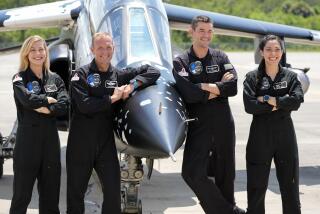Shuttle Atlantis to Begin Venus Mission Today : NASA Dubs Countdown to Launch of Magellan Probe ‘Squeaky Clean’
- Share via
KENNEDY SPACE CENTER, Fla. — Nature and man have combined for a perfect prelude to the scheduled launch of the shuttle orbiter Atlantis today at 11:24 a.m. PDT.
With postcard-perfect weather and a countdown that NASA engineers have termed “squeaky clean,” Atlantis is all set to carry into space the sophisticated Magellan spacecraft that will map 80% of the surface of Venus.
“We’re ready to go fly,” said Rear Adm. Richard H. Truly, whom President Bush recently nominated as the new head of NASA.
NASA officials said they could not remember a smoother countdown. This is the first one “where we have not had to change out a component or caucus and talk about a technical problem,” said launch director Robert B. Sieck.
First of Science Series
Today’s launch, the fourth shuttle launch since the Challenger exploded during its ascent in January, 1986, and the 29th overall, marks the first launch of a planetary probe since 1978 and the first such launch from the shuttle. It is also the first of a yearlong series of science launches that will include the Galileo probe to Jupiter and the orbiting of the Hubble Space Telescope.
“Magellan marks the resurgence of the U.S. planetary program,” said Lennard A. Fisk, NASA’s associate administrator for space science and applications, who noted that the Soviet Union had launched several probes during the period. “We had a planetary program in danger of being an also-ran.”
Magellan, named for the 15th-Century Portuguese explorer, is scheduled to be ejected from Atlantis’ payload bay 6 hours and 18 minutes after launch. An hour later, its solid rocket motor will be ignited, sending the probe on its 15-months-long, 806-million mile journey to the cloud-shrouded planet.
Using a sophisticated radar mapping device built by Hughes Aircraft Co. and controlled by researchers at the Jet Propulsion Laboratory in Pasadena, the $325-million probe will construct a highly detailed picture of Venus’ surface, sending back more data than has been produced by all previous planetary probes combined.
With this data, researchers hope to learn about the tectonic processes that cause “venusquakes.” That knowledge should be useful on Earth, where much of the information about tectonic motions has been obscured by erosion and weathering. Researchers also hope to learn more about the so-called “runaway greenhouse effect” that has raised the surface temperature of Venus to about 1600 degrees Fahrenheit.
Narrow Launch Window
Atlantis will have a 23-minute “window” today during which the launch can be accomplished. If it were launched any earlier than that, it would not have enough fuel to place Magellan in the proper orbit for the most energy-efficient route to Venus. If it were launched any later, darkness will have fallen at the African and European landing strips to which it must descend if the takeoff is aborted.
If today’s launch is delayed for some reason, the window will increase by a few minutes each day until it has reached two hours in about two weeks. NASA has five weeks during which the planets are in the proper conjunction for a launch. The next opportunity will not come until 1991.
The commander of the Atlantis crew, Navy Capt. David M. Walker, 44, was a member of the Discovery crew that retrieved two malfunctioning communications satellites in 1984. An accomplished athlete and a self-professed Florida native, Walker completed two combat cruises in Vietnam as a fighter pilot aboard the carriers Enterprise and America.
The pilot is Air Force Col. Ronald J. Grabe, 43, who was also pilot for the maiden voyage of Atlantis in 1985. Grabe, who is from New York City, flew 200 combat missions in Vietnam and was a test pilot for the A-7 and F-111.
The mission specialists are Norman E. Thagard, 45, and Mary L. Cleave, 42, both of whom are also making their second shuttle flight, and Air Force Major Mark C. Lee, 36, who is making his first flight. Thagard is a Florida-born physician who flew 163 combat missions in Vietnam.
Cleave, who is from New York, has a doctorate in civil and environmental engineering, and was a mission specialist on a 1985 flight on which three communications satellites were launched. The Wisconsin-born Lee is a mechanical engineer who has logged more than 2,200 hours flying.
Among the visitors here to observe the launch are cosmonaut Igor Volk, the chief test pilot of the Soviet space shuttle--which has yet to make a manned flight--and Soviet scientists who will help analyze the data returned by Magellan. Volk is believed to be the first cosmonaut to attend a launch of the U.S. space shuttle.
The four-day mission is scheduled to end Tuesday, when Atlantis will land at California’s Edwards Air Force Base at 12:20 p.m.





